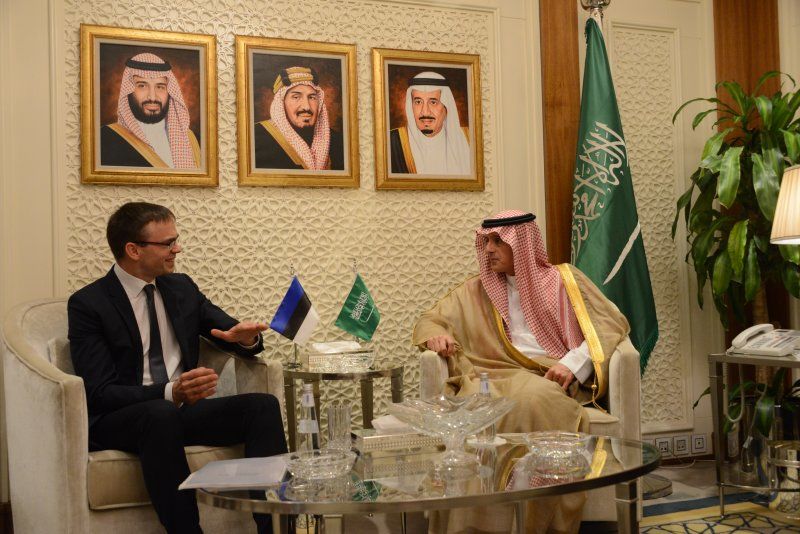The Estonian foreign ministry has yet again neglected to walk the walk – this time in Saudi Arabia.
Sven Mikser, the Estonian foreign minister, was recently on a working visit to Saudi Arabia, where he said that “Estonia would like to strengthen relations” with the country. “Relations between Estonia and Saudi Arabia are good but have remained on a modest level so far. During this visit we both identified different areas where the two countries can strengthen relations,” Mikser said in a statement, released by the foreign ministry.
Mikser’s eagerness to “strengthen relations” with another backward country without pointing at its shortcomings discredits the integrity of the Estonian foreign policy – again.
As this outlet has pointed out before, while the Estonian government is publicly committed to widening the democratic space based on rule of law and ensuring full respect for human rights, it has turned a blind eye on the human rights violations in countries such as Azerbaijan and Turkey.
In terms of human rights, Saudi Arabia is a much worse case than Turkey – which was one of the most liberal Muslim countries until the authoritarian leader, Recep Tayyip Erdoğan, messed it all up. And if Turkey is a strong and influential NATO ally – Estonia doesn’t have a luxury of pick-and-choose of its military allies – then Saudi Arabia does not play any military role outside the region; nor is it particularly unfriendly with Russia.
Therefore, the idea of cosying up to yet another totalitarian state that has a horrible record on human rights abuses is, mildly put, puzzling.
Estonian World briefly reminds the Estonian foreign ministry, led by Sven Mikser, some of the abuses the clan-controlled Saudi Arabia is known for.
Executions after unfair trials
According to Amnesty International, one of the largest human rights organisations in the world, the Saudi Arabian authorities have severely restricted freedoms of expression, association and assembly. Several Shia activists were executed, and many more were sentenced to death following grossly unfair trials, the 2017/2018 report said. Torture and other ill-treatment of detainees remained common. The authorities used the death penalty extensively, carrying out scores of executions.
Saudi courts continued to impose death sentences for a range of crimes, including drug offences or for conduct that under international standards should not be criminalised, such as “sorcery” and “adultery”. Many defendants were sentenced to death after unfair trials by courts that convicted them without adequately investigating allegations of coerced “confessions”, including under torture. The authorities routinely failed to inform families of their relatives’ imminent execution or failed to inform them immediately after executions had been carried out.
Despite limited reforms, women faced systemic discrimination in law and practice and were inadequately protected against sexual and other violence. This alone should be a red flag to the Estonian foreign policy makers, as women’s rights, gender equality and the empowerment of women have been some of the priorities of Estonia’s foreign policy – well, in the public rhetoric at least.
The Saudi authorities have also continued to repress peaceful activists and dissidents, harassing writers, online commentators and others who exercised their right to freedom of expression by expressing views against government policies. The Washington, DC, based Freedom House rates Saudi Arabia at the bottom in terms of both civil liberties and political rights.
Funding the repressive Islamic theology
A number of Saudi royals is also known for funding the fundamentalist Wahhabis to propagate their backward and repressive Islamic theology abroad. It is worth remembering here that the majority of Sunni and Shia Muslims worldwide disagree with the interpretation of Wahhabism, and many Muslims denounce them as a faction or a “vile sect”.
According to the Estonian ministry of foreign affairs, protecting and advancing human rights is essential to guaranteeing global peace and security. “Estonia’s priorities also include internet freedom, supporting civil society and fight against impunity. Estonia is actively promoting those topics on international as well as bilateral level and through its development cooperation,” the ministry website clearly states.
Yet, in a country after another, the Estonian foreign policy makers fail to follow what they preach. This publication argues that it’s time again not just talk the talk, but also walk the walk.
I
Cover: Sven Mikser meeting his Saudi Arabian counterpart, Adel Al-Jubeir, in Riyadh (courtesy of the Estonian foreign ministry).

